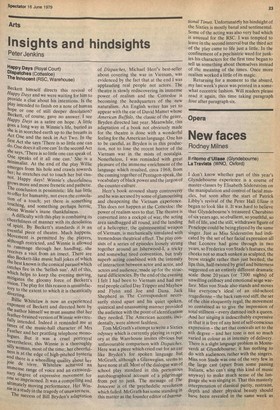Insights and hindsights
Peter Jenkins
Happy Days (Royal Court) Dispatches (Cottesloe) The Innocent (RSC, Warehouse) Beckett himself directs this revival of Happy Days and we were waiting for him to provide a clue about his intentions. Is the Play intended to finish on a note of human hope or one of still deeper desolation? Beckett, of course, gave no answer. I see Happy Days as a satire on hope. A little goes a long way in Winnie's life, buried as She is in scorched earth up to the breasts in Act One and the neck in Act Two. In the first Act she says 'There is so little one can do. One does it all one can' In the second Act She says, 'There is so little one can speak of. One speaks of it all one can.' She is a minimalist. At the end of the play Willie emerges from his hole and crawls towards her; he stretches out to touch her but cannot. Happy days! Winnie's cheerfulness grows more and more frenetic and pathetic. The conclusion is pessimistic: life has little t? offer for humanity, not even the consolation of a touch; yet there is something touching, and something perhaps heroic, about Winnie's inane thankfulness. . A difficulty with this play is combining its Cheerfulness of manner with its desolation of spirit. I3y Beckett's standards it is an eventful piece of theatre. Much happens. Movement is permitted by the players, although restricted, and Winnie is allowed to rummage through her handbag; she receives a visit from an insect. There are also Beckett-like music hall jokes of which the best known is the comical parasol which catches fire in the 'hellish sun'. All of this, Which helps to keep the evening moving, m.itigates the gloomy force of Beckett's vision. The play for this reason is unsatisfactory to the extent to which it is theatrically diverting. Billie Whitelaw is now an experienced exponent of Beckett and directed here by the author himself we must assume that her feather-brained version of Winnie was carefully intended. Indeed it reminded me at tunes of the music-hall character of Mrs rFeather and her prattling telephone monologues. But it was a cruel portrayal nevertheless; this Winnie is a thoroughly silly woman, most of the time; her cheerfulness is at the edge of high-pitched hysteria fl.d there is a wheedling quality aboui her lote de vivre. Whitelaw achieved an Immense range of voice and an extraordinary degree of expressive movement for one so imprisoned. It was a compelling and Ultimately moving performance. Her Winrue is a study in the tragedy of unawareness. The success of Bill Bryden's adaptation of Dispatches, Michael Hen's best-seller about covering the war in Vietnam, was evidenced by the fact that at the end I was applauding real people not actors. The theatre is slowly rediscovering its immense power of realism and the Cottesloe is becoming the headquarters of the new naturalism. An English writer has yet to appear with the ear of David Mamet whose American Buffalo, the classic of the genre, Bryden directed last year. Meanwhile, this adaptation of a book not obviously made for the theatre is done with a wonderful feeling for the American language. One has to be careful, as Bryden is in this production, not to lose the recent horror of the Vietnam war in the mists of nostalgia. Nonetheless, I was reminded with great pleasure of the immense enrichment of the language which resulted, circa 1968, from the coming together of Pentagon-speak, the vocabulary of black power and the jargon of the counter-culture.
Herr's book aroused sharp controversy and he was accused by some of glamourising and cheapening the Vietnam experience. This does not happen at the Cottesloe: the power of realism sees to that. The theatre is converted into a cockpit of war, the acting area sandbagged all round, and the landing of a helicopter, the quintessential weapon of Vietnam, is mechanically simulated with tremendous theatrical effect. The play consists of a series of episodes loosely strung together around an Isherwood-I, a tricky and somewhat tired convention, but truly superb acting combined with the intensity of interaction between actor and actor, and actors and audience .made up for the structural difficiencies. By the end of the evening I felt I had been to Vietnam and had met real people called Day Tripper and Mayhew and Flynn and Joe and Dana. Jack Shepherd as The Correspondent necessarily stood apart and his quiet spoken, quizzical and unassuming manner provided the audience with the point of identification they needed. The American accents, incidentally, were almost faultless. Tom McGrath's attempt to write a Sixties odyssey which is currently playing in repetory at the Warehouse invites obvious but unfavourable comparison with Dispatches. Here was a piece which cried out for an ear like Bryden's for spoken language but McGrath, although a Glaswegian, seems to have none at all. Most of the dialogue was of school play standard in this portentous autobiographical account of a pilgrimage from pot to junk. The message of The Innocent is of the psychedelic revolution which failed. McGrath has some standing in this matter as the founder editor of Interna tional Times. Unfortunately his hindsight of the Sixties is mostly banal and sentimental. Some of the acting was also very bad which is unusual for the RSC. I was tempted to leave in the second interval but the third act -of the play came to life just a little. In the confinement of a psychiatric ward for junkies his characters for the first time began to tell us something about themselves instead of the meaning of the times. Once more realism worked a little of its magic.
Returning for a moment to the absurd, my last week's piece was printed in a somewhat eccentric fashion. Will readers please read it again, this time taking paragraph four after paragraph six.


































 Previous page
Previous page